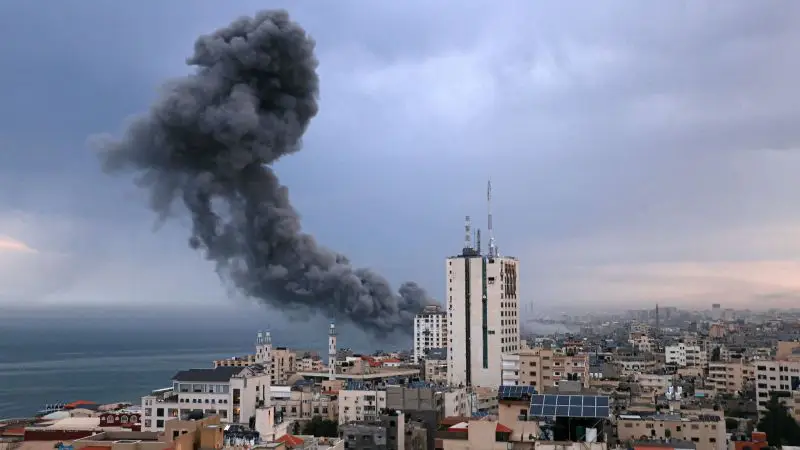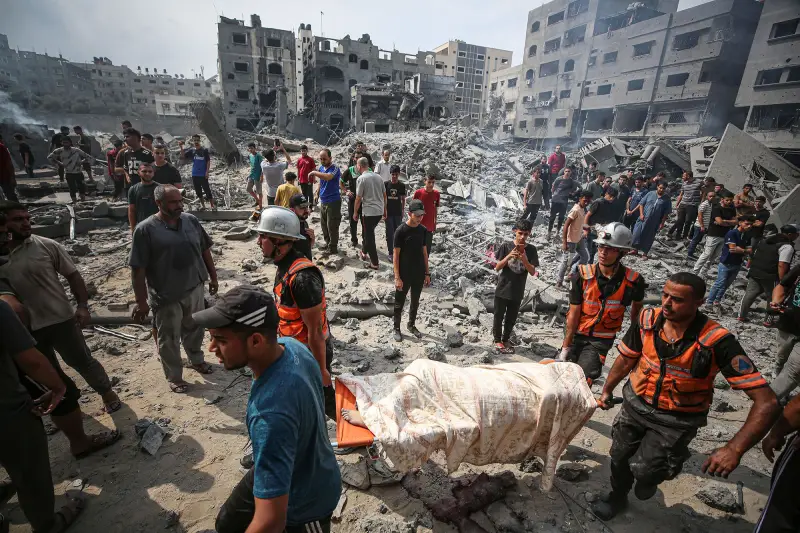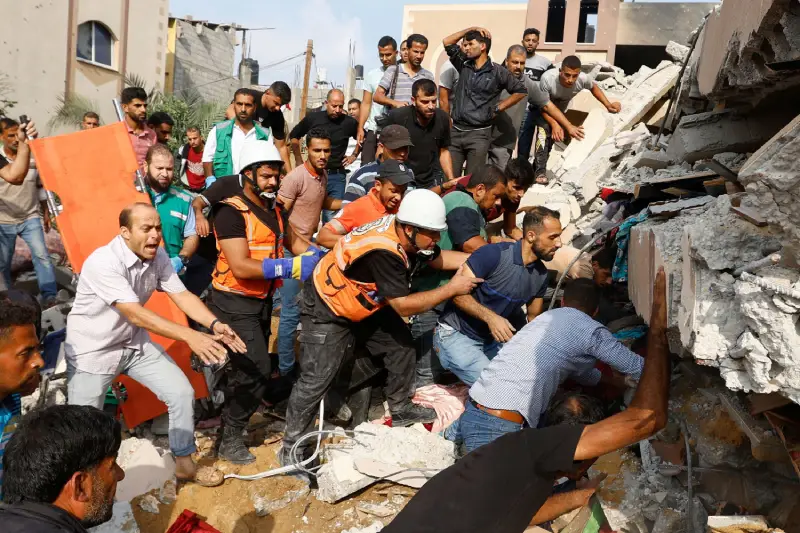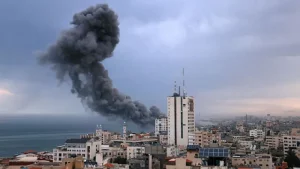Gallant: Israel’s Shift to Full Offensive Mode and the Unforeseeable Future for Gaza
6 min read
In his recent address, US President Joe Biden condemned the recent violence in the Israel-Gaza conflict, describing it as deeply troubling. Biden expressed worry over the loss of civilian lives and the escalation of hostilities in the region.
The conflict, which has seen a marked increase in violence in few days, has resulted in the tragic loss of life on both sides. President Biden called for a quick ceasefire and urged Israeli and Palestinian authorities to work towards a peaceable resolution.

The situation in the Israel-Palestine Conflict, including Israel and Gaza, is complex, with recorded and geopolitical factors donating to the ongoing tensions. It is essential to evaluate the historical context of the conflict, including the displacement of Palestinians and the establishment of the state of Israel in 1948. Furthermore, it is crucial to consider the involvement of regional and international stakeholders in the conflict and to reflect on past peace negotiation efforts in order to gain a comprehensive understanding of the situation.
In addressing the situation, President Biden underscored the significance of pursuing a peaceful and diplomatic resolution that appreciates the rights and security of both Israeli and Palestinian parties.
It is essential to approach the Israel-Gaza conflict with a balanced perspective, recognizing the suffering of civilians on both sides and the complexities of the historical and geopolitical factors at play.
Table of Contents
Pleas for hostages’ safe return
In the wake of the recent hostage crisis created by Hamas militants in Gaza, it’s crucial to delve deeper into the motives driving this unsettling situation. Videos circulating on social media have shown the distressing scenes of militants apprehending numerous civilians, including children. These heart-wrenching moments have started anxious appeals from Israeli families for the safe return of their loved ones.
The hostages aren’t limited to Israeli citizens alone; individuals of different nationalities, including Americans, Mexicans, Brazilians, and Thais, are also believed to be held captive. This international dimension adds intricacy to Israel’s response to the Hamas attack. Authorities from Peru, Paraguay, Brazil, and Mexico have reported at least nine of their citizens missing, further highlighting the multi-national nature of this crisis.
Efforts to negotiate and resolve the hostage situation have been underway. Qatar has been engaged in talks with Hamas regarding the hostages held in Gaza, while the United States has been coordinating with Qatar to play a crucial mediating role.
A peaceful resolution is being pursued by both sides, with further details and comments from the governments of Qatar and Israel eagerly awaited. Abu Obaida, the spokesperson for the Al-Qassam Brigades, has made it clear that Hamas will not engage in negotiations regarding the hostages while under Israeli military actions.
Families anxiously await the return of their loved ones, and the international community watches closely, hoping for a peaceful resolution to this distressing trial.
What specific actions are being taken by Qatar and the United States to resolve the crisis?

What specific objectives does Hamas hope to achieve through the hostage situation?
The recent hostage situation orchestrated by Hamas militants in Gaza has raised critical questions about the motives behind their actions, Israel’s willingness to negotiate a ceasefire and hostage release, and the role of international actors, Qatar and the United States, in resolving this crisis.
Hamas’s Objectives:
To understand the reasons behind Hamas’ decision to take hostages., it’s crucial to analyze their past strategies. They have historically used hostage situations to gain political power and bring attention to the Palestinian cause. Therefore, Hamas aims to draw attention to their cause and gain political influence.
- International Attention: By holding hostages, including Israeli army officers, Hamas seeks to draw global attention to the Palestinian struggle, generating sympathy and support for their cause.
- Negotiation Leverage: Hostages can be used as bargaining chips in potential negotiations with Israel. Hamas aims to secure concessions, such as the release of Palestinian prisoners or the easing of restrictions in Gaza, in exchange for the hostages’ safe return.
How willing is Israel to negotiate a ceasefire and release of hostages?
Israel’s Stance on Negotiations:
Israel has historically adhered to a policy of not negotiating with terrorists. Regarding the current hostage crisis, Israel’s stance remains firm, emphasizing its commitment to ensuring the safety of its citizens.
- Ceasefire Negotiations: Israel’s top priority is the cessation of hostilities initiated by Hamas. While open to negotiations for a ceasefire, Israel is cautious about engaging in direct talks with a group it considers a terrorist organization. The involvement of intermediaries may be essential for any progress.
- Hostage Release: Israel has expressed its commitment to the safe return of its citizens and soldiers currently held hostage. However, it remains steadfast in its refusal to make concessions to terrorist organizations. The role of mediators, like Qatar and the United States, may be pivotal in facilitating negotiations.
What specific actions are being taken by Qatar and the United States to resolve the crisis?
International Mediation:
Qatar, with its established ties to Hamas, and the United States, as a longstanding ally of Israel, are actively involved in efforts to resolve the crisis.
- Qatar’s Mediation: Qatar has engaged in talks with Hamas regarding the hostages it is holding in Gaza. As a regional mediator, Qatar “The role played is of immense importance.” in facilitating dialogue between the Palestinian group and Israel. The specifics of these negotiations, including potential concessions, are yet to be disclosed.
- U.S. Involvement: The United States, while standing firmly with Israel, has expressed concern about the hostages’ safety, including American citizens among them. The U.S. administration is working closely with Qatar to mediate the crisis and secure the release of all hostages. This diplomatic effort aligns with President Biden’s commitment to addressing humanitarian crises.
Conclusion:
The Hamas hostage crisis in Gaza is a complex and evolving situation with profound implications for Israelis and Palestinians. Qatar and the US are actively mediating, but the path to resolution is uncertain. The world hopes for a peaceful solution that ensures the safe return of all hostages and avoids harm to civilians.
Sounds of Battle:
While the full scope of Israel’s response remains uncertain, Prime Minister Benjamin Netanyahu has anticipated a “long and challenging war” and pledged “powerful retaliation” against Hamas.
Hecht, on Sunday, stated that the IDF’s primary focus in the upcoming hours and days is to “assert control over the exclusive enclave and neutralize all terrorists within our territory.”
Israel’s declaration of war has set the stage for a significant military operation in Gaza, with tanks and personnel carriers observed mobilizing near the Israel-Gaza border on Sunday.
As tensions rise, Israel has evacuated communities near Gaza and called up reservists. In addition, they have requested precision-guided bombs and extra interceptors for their Iron Dome missile system from the US. The requested kit, called JDAMs, can convert unguided bombs into smart weapons that can precisely target specific locations.
The US Defense Secretary, Lloyd Austin, has confirmed that the US will promptly provide security assistance to Israel. In addition, the US has deployed a Navy carrier strike group to the eastern Mediterranean Sea, consisting of guided missile destroyers and cruisers.
Horror on the Ground:
Many Israelis have pursued refuge in bomb shelters and safe rooms during these past two days. Throughout the weekend of violence, Hamas rockets have struck multiple locations within Israel, including Tel Aviv. Armed terror groups have infiltrated Israel, entering military bases, towns, and farms, targeting civilians and taking hostages.
The assault has had a deep impact on Israel, with casualties extending beyond its borders. Among those killed in Israel, there are twelve Thai citizens, ten Nepalis, two Ukrainians, two French nationals, and one British citizen.
Rescue teams have recovered the remains of at least 107 individuals, many of whom were local civilians, from the Be’eri kibbutz in southern Israel, according to the Israeli rescue service Zaka.
Images released by the Israeli foreign ministry depict the aftermath of an attack by Hamas gunmen on a music festival near the Israel-Gaza border, an incident that emergency responders have indicated resulted in at least 260 fatalities.






